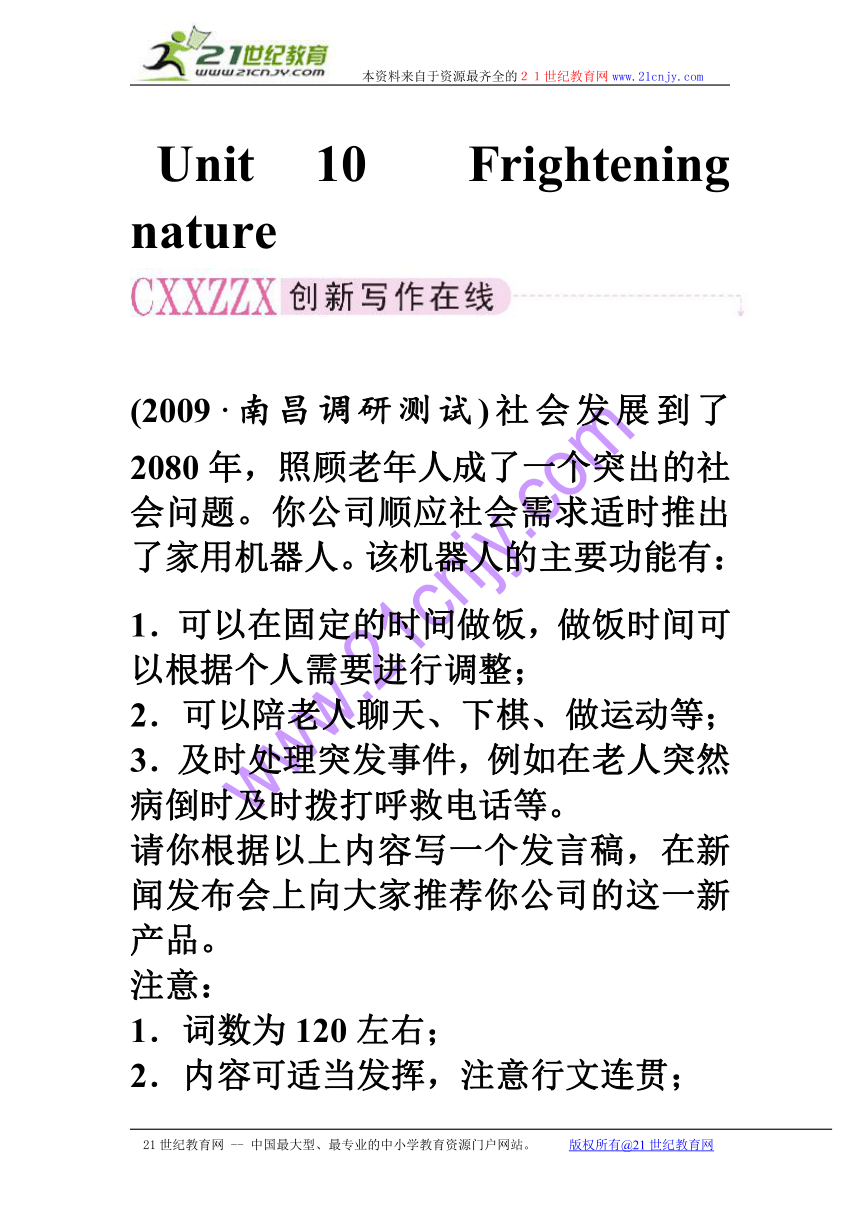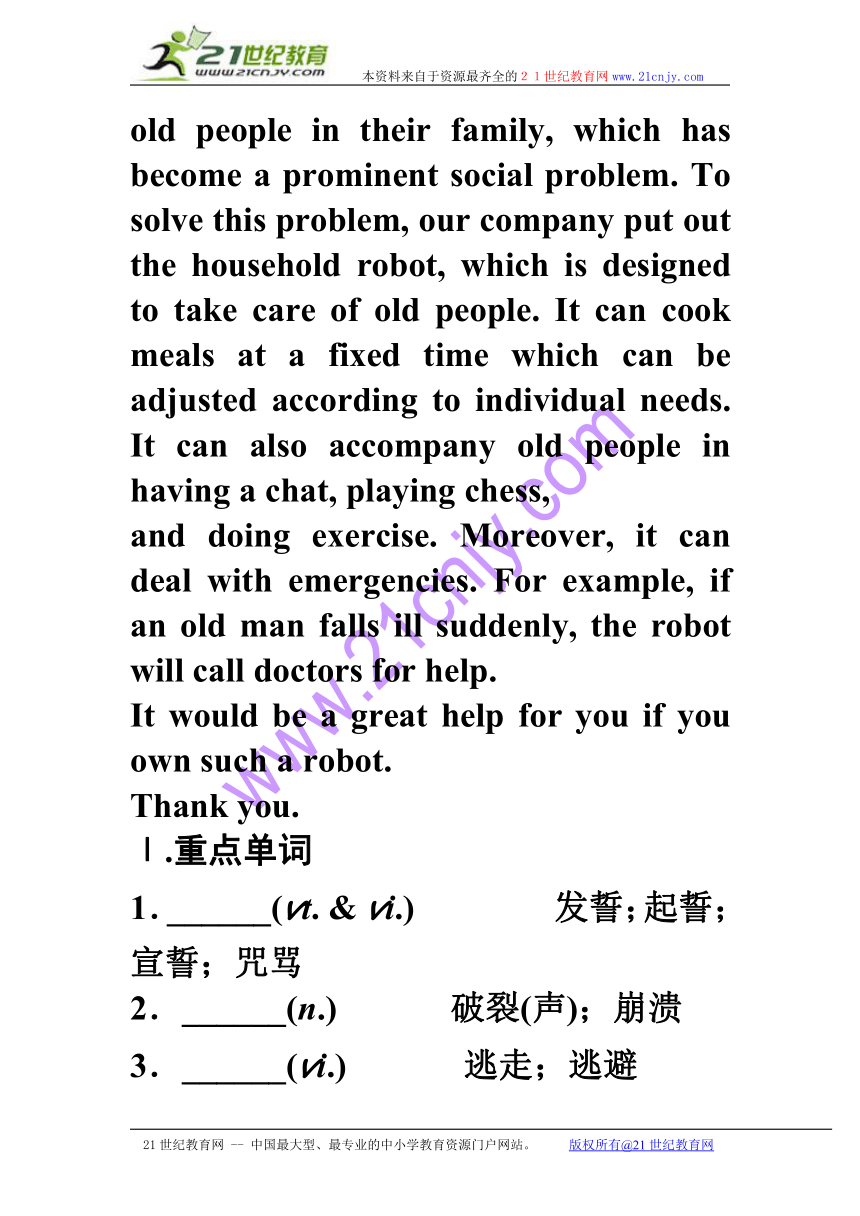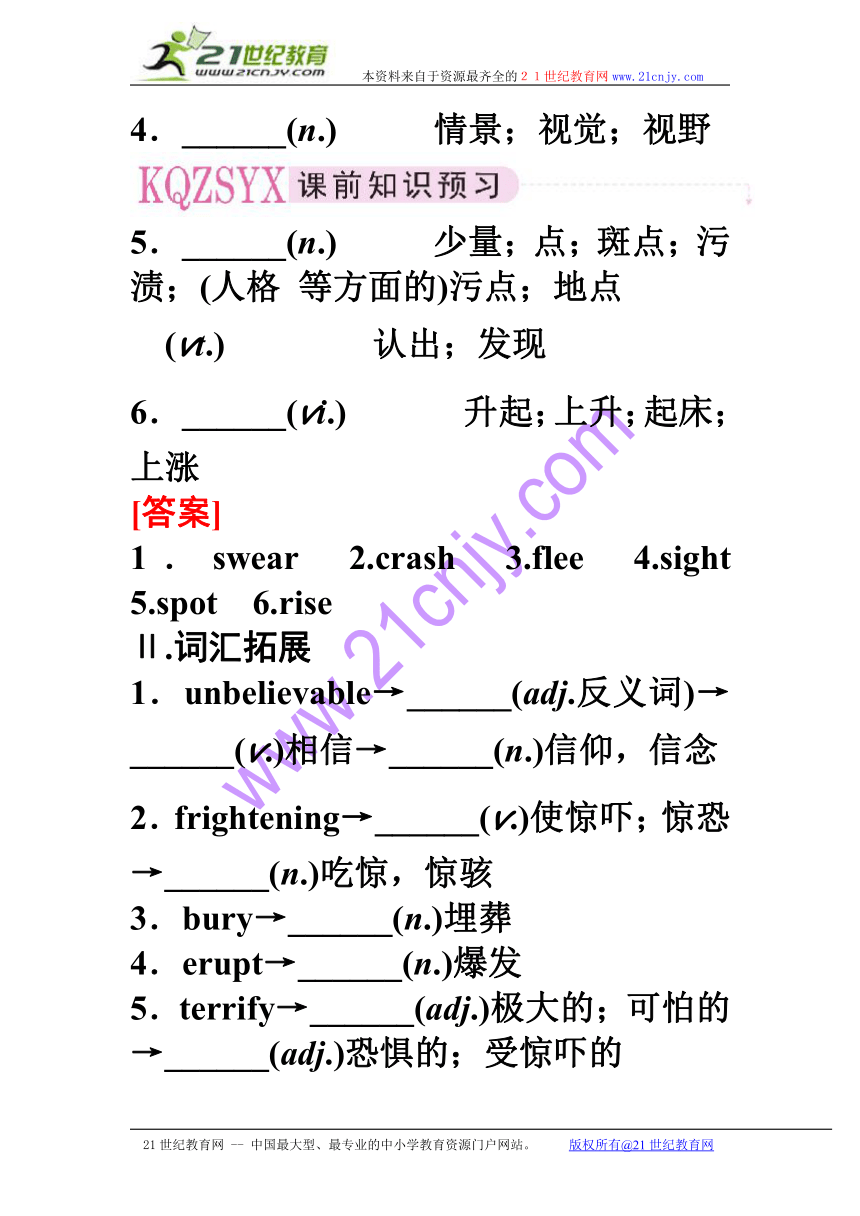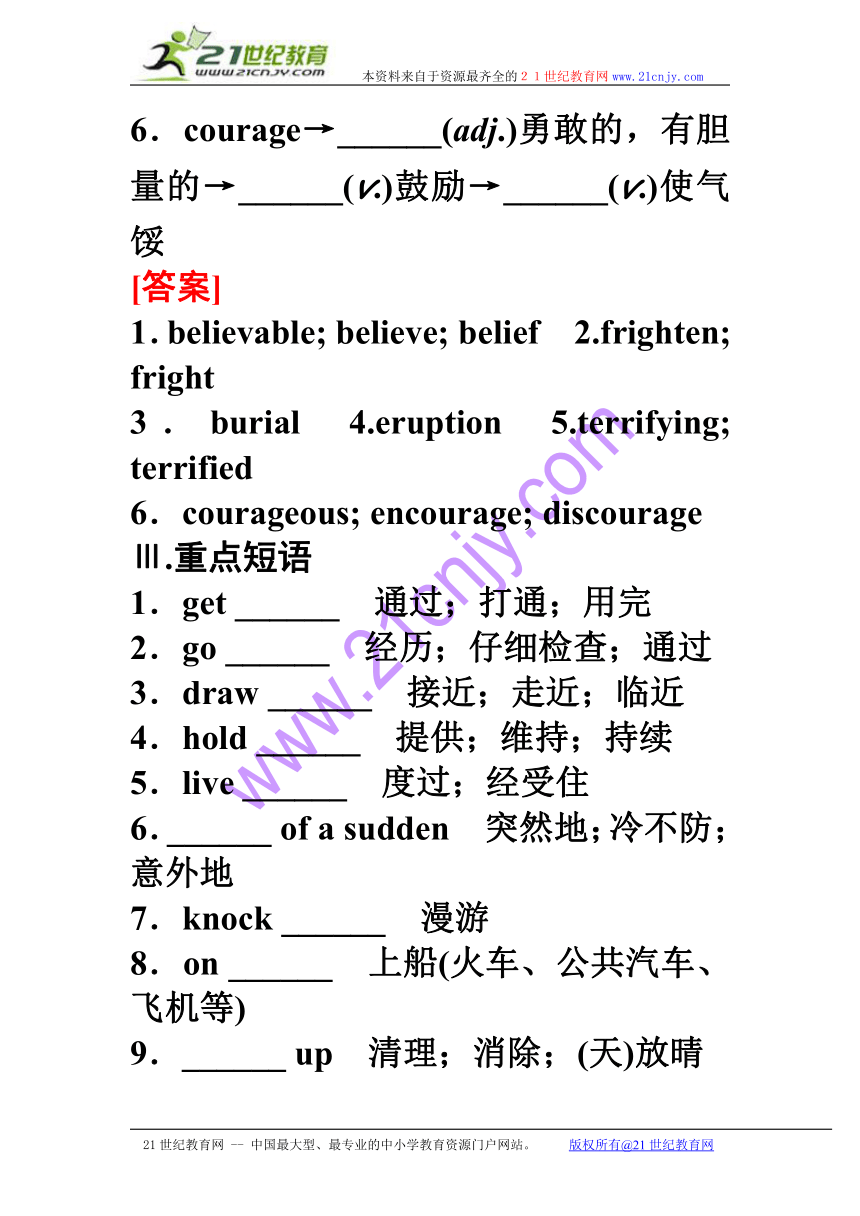备考2011高效学习方案英语高二册:unit 10 frightening nature
文档属性
| 名称 | 备考2011高效学习方案英语高二册:unit 10 frightening nature |

|
|
| 格式 | rar | ||
| 文件大小 | 114.3KB | ||
| 资源类型 | 教案 | ||
| 版本资源 | 人教版 | ||
| 科目 | 英语 | ||
| 更新时间 | 2010-12-14 00:00:00 | ||
图片预览





文档简介
本资料来自于资源最齐全的21世纪教育网www.21cnjy.com
Unit 10 Frightening nature
(2009·南昌调研测试)社会发展到了2080年,照顾老年人成了一个突出的社会问题。你公司顺应社会需求适时推出了家用机器人。该机器人的主要功能有:
1.可以在固定的时间做饭,做饭时间可以根据个人需要进行调整;
2.可以陪老人聊天、下棋、做运动等;
3.及时处理突发事件,例如在老人突然病倒时及时拨打呼救电话等。
请你根据以上内容写一个发言稿,在新闻发布会上向大家推荐你公司的这一新产品。
注意:
1.词数为120左右;
2.内容可适当发挥,注意行文连贯;
3.短文开头已为你写好,不计入总词数。
参考词汇:突出的,显著的——prominent。
Ladies and gentlemen, thank you for attending our company’s news conference. As you know,________________________________________________________________________
________________________________________________________________________
________________________________________________________________________
[参考答案]
Ladies_and_gentlemen,_thank_you_for_attending_our_company’s_news_conference._As_you_know,_with the development of economy, people have to face various pressures. They don’t have enough time to attend to the old people in their family, which has become a prominent social problem. To solve this problem, our company put out the household robot, which is designed to take care of old people. It can cook meals at a fixed time which can be adjusted according to individual needs. It can also accompany old people in having a chat, playing chess,
and doing exercise. Moreover, it can deal with emergencies. For example, if an old man falls ill suddenly, the robot will call doctors for help.
It would be a great help for you if you own such a robot.
Thank you.
Ⅰ.重点单词
1.______(vt. & vi.) 发誓;起誓;宣誓;咒骂
2.______(n.) 破裂(声);崩溃
3.______(vi.) 逃走;逃避
4.______(n.) 情景;视觉;视野
5.______(n.) 少量;点;斑点;污渍;(人格 等方面的)污点;地点
(vt.) 认出;发现
6.______(vi.) 升起;上升;起床;上涨
[答案]
1.swear 2.crash 3.flee 4.sight 5.spot 6.rise
Ⅱ.词汇拓展
1.unbelievable→______(adj.反义词)→______(v.)相信→______(n.)信仰,信念
2.frightening→______(v.)使惊吓;惊恐→______(n.)吃惊,惊骇
3.bury→______(n.)埋葬
4.erupt→______(n.)爆发
5.terrify→______(adj.)极大的;可怕的→______(adj.)恐惧的;受惊吓的
6.courage→______(adj.)勇敢的,有胆量的→______(v.)鼓励→______(v.)使气馁
[答案]
1.believable; believe; belief 2.frighten; fright
3.burial 4.eruption 5.terrifying; terrified
6.courageous; encourage; discourage
Ⅲ.重点短语
1.get ______ 通过;打通;用完
2.go ______ 经历;仔细检查;通过
3.draw ______ 接近;走近;临近
4.hold ______ 提供;维持;持续
5.live ______ 度过;经受住
6.______ of a sudden 突然地;冷不防;意外地
7.knock ______ 漫游
8.on ______ 上船(火车、公共汽车、飞机等)
9.______ up 清理;消除;(天)放晴
10.______ sb. to do sth. 催促某人做某事
11.come to ______ 苏醒过来;发生兴趣
12.______ damage to 对……造成破坏
13.pick ______ 挑选;辨认出
14.light ______ 点燃;(使)变得容光焕发
15.calm (sb.) ______ (使某人)镇静;(使某人)平
静;(使某人)宁静
16.call ______ 要求;提倡
17.______ the foot of 在……的底部
18.come ______ 跌落;衰落;下降
19.______ hand 在手边;在附近
20.______ one’s attention (to) 吸引某人的注意
21.be ______ to death 吓死
22.______ end 直立;竖着
23.be ______ to death 惊恐而死
24.get into a total ______ 陷入恐慌
[答案]
1.through 2.through 3.near 4.out 5.through
6.all 7.about 8.board 9.clear 10.urge
11.life 12.cause 13.out 14.up 15.down
16.for 17.at 18.down 19.at 20.draw
21.frightened 22.on 23.scared 24.panic
Ⅳ.重点句型
1.Upon arrival, my uncle hugged Pompy and tried to give him courage.
叔叔一到那里就拥抱庞皮,尽力给他打气。
2.He looked more asleep than dead.
与其说是他死了,倒不如说他是睡着了。
3....for it is one thing to write a letter, another to write history.
……写一封信是一回事,而写历史又是另外一回事。
Ⅴ.重点语法
Ellipsis(省略句)
Ⅰ.词汇聚焦
1.attend v. 参加,出席;服侍,照顾
[指点迷津]
attend, join, join in与take part in
attend主要指出席,参加某一活动,强调出席者只在其中“听”或“看”,不起积极作用,宾语主要是会议、课堂、演讲、典礼等。
join指参加某一团体或组织并成为其中成员,如:join the army/Party/League参军/入党/入团。
join in指参加某项正进行着的具体活动,也可以说join sb. in (doing) sth.表示“和某人一起做某事,加入到某人的活动中来”。
take part in指参加活动、会议、运动会等,并在其中起着积极的作用。
The games which the young man ______ were difficult to play.
A. take part in B. attended
C. joined D. joined in
解析:which引导定语从句修饰the games,因此,答案为join in the games。
答案:D
2.sight n. 视力;情景,景象
[思维拓展]
on/at sight一见(就)
at (the) sight of一看见
at first sight乍一见
catch/get/have (a) sight of看见,发现
lose sight of看不见
out of sight不被看见,在视线之外
in/within sight被见到,在视线内
We watched the train until it ______ gradually.
A. lost sight B. caught sight
C. came into sight D. was out of sight
解析:根据题意,此处指火车逐渐驶出视野,应选D项,A、B明显不可,而C项表示“进入视野”,与整个句意不符。
答案:D
3.terrify vt. 使恐怖,使惊吓,吓唬
[思维拓展]
be terrified at/with...被……吓一跳
be terrified out of one’s senses/wits吓得魂不附体
terrify sb. into doing...吓唬某人做某事
be terrified of对……感到惊恐
terror n. 恐怖,惊骇
in terror惊慌地
have a terror of sth.对某事感到惊恐
be a terror to sb.让某人感到恐惧的人或事
[指点迷津]
scared, frightened与terrified
三者意义相同,只是程度不同:scared语气最弱,terrified语气最强。
①We were terrified that the bridge would collapse.
②I felt a bit scared when the plane took off.
③The child was frightened by the big dog.
Ⅱ.短语突破
1.knock about(风浪)冲击(船只);粗暴对待;接连打击;存在;到处漫游
①If that man knocks his wife about any more, he’ll be sent to prison.
②There’s plenty of money knocking about if you are to look.
[思维拓展]
knock...out of从……中敲出……
knock back反击
knock down把(人)击倒;拆除
knock off停止(工作);减价
knock into将……打入;强迫灌输;撞上
knock over推翻,撞倒
knock against撞到,偶然遇见
______ at the door before entering, please.
A. Knocked B. To knock
C. Knocking D. Knock
解析:该句缺少主语,故应该用祈使句形式。
答案:D
2.at a distance从某一距离,在某一距离
[思维拓展]
at a distance of...在距离……(多远)处
in the distance在远处
keep a distance away保持一定距离
by distance按里程
work out distance计算出距离
from a distance从远处
keep one’s distance保持距离;不亲近
It looks quite nice ______, but when you get close you can see that it’s pretty awful.
A. in the distance
B. from the distance
C. at a distance
D. within a distance
解析:空格处应与后文的get close构成对比,故应该表示“隔开一段距离,从远处”之意。故应选C。
答案:C
3.as though
as though相当于as if,它们引导的从句常用虚拟语气,表示动作或状态与事实相悖。如:
He spoke to me as if I were deaf.
She speaks French so well as if she had studied in France.
[指点迷津]
若as if引导的虚拟语气的句子中的谓语动词与主句中的谓语动词所表达的动作同时发生或as if从句中的动词表状态时,从句动词用一般过去时。
若as if从句中谓语动词的动作发生在主句谓语动词之前,则用过去完成时。
When a stick is partly in water, it looks as if it ______.
A. breaks B. has broken
C. were broken D. had been broken
解析:句意是:当把棍子的一部分放进水里的时候,看上去好像这根棍子断了。as if之后用虚拟语气,从looks上看,这个虚拟语气表示的是与现在事实相违背的情况,这时从句应用一般过去时。
答案:C
4.at hand即将来到;在近处,在手边
[思维拓展]
near at hand, close at hand, next one’s hand, ready at hand, ready to hand, to hand
表达同at hand一样的意思。
by hand用手工
from hand to hand从一人之手转到他人之手
hand in hand手拉手地,携手,共同
on (the) one hand..., on the other (hand)...
一方面……,另一方面……
in hand随时可用
with one’s own hand由某人亲自
at first hand直接地,亲自
Are your socks knitted ______ or machine-made
A. at hand B. by hand
C. in hand D. to hand
解析:该空格处应表示“用手工(做的)”,故应为by hand。
答案:B
5.draw one’s attention引起某人的注意
[思维拓展]
draw/attract/capture/command/catch/get one’s attention to引起某人的注意
bring...to one’s attention使某人注意到某事
focus/fix one’s attention on留心,专心于
direct/turn one’s attention to将注意力转向
hold one’s attention on将注意力集中于
devote one’s attention to专心于
Attention must ______ your pronunciation if you want to speak English well.
A. devoted to B. be paid
C. be brought D. be paid to
解析:根据语境,空格处应使用被动语态,又由attention的习惯搭配,pay与bring均需与to连用。
答案:D
6.live through活过,经历(困难,危险)而未死,不能用于被动语态
[思维拓展]
live on主要吃……,以吃……维持生活
get/put sb. through to使某人接通到……
go through通过,经历,搜遍
pass through从……中经过,走过……
look through浏览;仔细查看;对……视而不见
break through突破(障碍)
The old lady is not to ______ the winter.
A. live through B. go through
C. get through D. come through
解析:本题题意为“那个老太太不可能活过这个冬天”。表示“活过”应该用live through。
答案:A
7.upon arrival=on arrival一到达就……
介词on/upon作“在……时”;“在……之后”解,后跟v.-ing形式或接名词,相当于一个as soon as引导的时间状语从句,强调一个动作一发生,另一个动作便立即发生。
英语中可以表示“一……就……”的结构还有:as soon as; the moment/instant/minute/second; instantly/immediately/directly; no sooner...than.../hardly...when.../scarcely...when。如:
①Upon/On his return from Beijing, he began his research work.
②The moment she heard the news, she went pale.
③No sooner had I got into the car than I heard a man call my name.
______ he got home, he wrote a letter to me.
A. While B. The moment
C. Suddenly D. Once
解析:the moment名词短语可用作从属连词,引导时间状语从句,意为“一……就……”,相当于as soon as; suddenly不能用作连词;while和once在此意义欠妥。
答案:B
Ⅲ.句型归纳
1.Ash and bits of rock that were burnt black were falling onto the ship now, darker and more, the closer they went.灰烬和烧黑的岩石开始往船上掉,他们走得越近,(灰烬和岩石)就越黑,越多。
“the+比较级,the+比较级”表达“越……就越……”。前者为从句,后者为主句,此处从句中的the省略。
[思维拓展]
more and more beautiful越来越美丽
larger and larger越来越大
more or less或多或少
more than=over超过,不仅仅是……
not more than=at most至多,不超过
no more than=only仅仅,与……一样不……
once more=once again再一次
In recent years travel companies have succeeded in selling us the idea that the further we go, ______.
A. our holiday will be better
B. our holiday will be the better
C. the better our holiday will be
D. the better will our holiday be
解析:表示“越……,就越……”之意,只有C项符合所需的固定句型。D项语序不对。
答案:C
2.Helped by two slaves he stood up, and immediately fell down dead.他由2个奴隶扶着站了起来,随即又倒了下去,死了。
句中dead作状语,用来说明主语的情况,表示结果。形容词用作状语主要表示原因、时间、伴随情况或结果。
Thirsty and eager to get a rest, he went into the tea house and seated himself at a little table by the window.由于有些口渴,又好想歇一会儿,他就走进茶馆,在靠近窗子的一张小桌旁坐了下来。
The old woman lay in bed, silent, thinking of her childhood.老妇人躺在床上,一声不吭,回忆起她的孩提时代。
[指点迷津]
形容词作状语表示原因,可看作是being现在分词短语作状语。
形容词作状语,逻辑主语通常是句中主语,但有时也可以是句中宾语。
After his journey from abroad, Richard Jones returned home, ______.
A. exhausting B. exhausted
C. being exhausted D. having exhausted
解析:exhausted是形容词,意为“精疲力竭的”,说明Richard Jones所处的状态;exhausting意为“令(身心)疲惫的 ”,常指事物;being exhausted只表示原因。
答案:B
21世纪教育网 -- 中国最大型、最专业的中小学教育资源门户网站。 版权所有@21世纪教育网
Unit 10 Frightening nature
(2009·南昌调研测试)社会发展到了2080年,照顾老年人成了一个突出的社会问题。你公司顺应社会需求适时推出了家用机器人。该机器人的主要功能有:
1.可以在固定的时间做饭,做饭时间可以根据个人需要进行调整;
2.可以陪老人聊天、下棋、做运动等;
3.及时处理突发事件,例如在老人突然病倒时及时拨打呼救电话等。
请你根据以上内容写一个发言稿,在新闻发布会上向大家推荐你公司的这一新产品。
注意:
1.词数为120左右;
2.内容可适当发挥,注意行文连贯;
3.短文开头已为你写好,不计入总词数。
参考词汇:突出的,显著的——prominent。
Ladies and gentlemen, thank you for attending our company’s news conference. As you know,________________________________________________________________________
________________________________________________________________________
________________________________________________________________________
[参考答案]
Ladies_and_gentlemen,_thank_you_for_attending_our_company’s_news_conference._As_you_know,_with the development of economy, people have to face various pressures. They don’t have enough time to attend to the old people in their family, which has become a prominent social problem. To solve this problem, our company put out the household robot, which is designed to take care of old people. It can cook meals at a fixed time which can be adjusted according to individual needs. It can also accompany old people in having a chat, playing chess,
and doing exercise. Moreover, it can deal with emergencies. For example, if an old man falls ill suddenly, the robot will call doctors for help.
It would be a great help for you if you own such a robot.
Thank you.
Ⅰ.重点单词
1.______(vt. & vi.) 发誓;起誓;宣誓;咒骂
2.______(n.) 破裂(声);崩溃
3.______(vi.) 逃走;逃避
4.______(n.) 情景;视觉;视野
5.______(n.) 少量;点;斑点;污渍;(人格 等方面的)污点;地点
(vt.) 认出;发现
6.______(vi.) 升起;上升;起床;上涨
[答案]
1.swear 2.crash 3.flee 4.sight 5.spot 6.rise
Ⅱ.词汇拓展
1.unbelievable→______(adj.反义词)→______(v.)相信→______(n.)信仰,信念
2.frightening→______(v.)使惊吓;惊恐→______(n.)吃惊,惊骇
3.bury→______(n.)埋葬
4.erupt→______(n.)爆发
5.terrify→______(adj.)极大的;可怕的→______(adj.)恐惧的;受惊吓的
6.courage→______(adj.)勇敢的,有胆量的→______(v.)鼓励→______(v.)使气馁
[答案]
1.believable; believe; belief 2.frighten; fright
3.burial 4.eruption 5.terrifying; terrified
6.courageous; encourage; discourage
Ⅲ.重点短语
1.get ______ 通过;打通;用完
2.go ______ 经历;仔细检查;通过
3.draw ______ 接近;走近;临近
4.hold ______ 提供;维持;持续
5.live ______ 度过;经受住
6.______ of a sudden 突然地;冷不防;意外地
7.knock ______ 漫游
8.on ______ 上船(火车、公共汽车、飞机等)
9.______ up 清理;消除;(天)放晴
10.______ sb. to do sth. 催促某人做某事
11.come to ______ 苏醒过来;发生兴趣
12.______ damage to 对……造成破坏
13.pick ______ 挑选;辨认出
14.light ______ 点燃;(使)变得容光焕发
15.calm (sb.) ______ (使某人)镇静;(使某人)平
静;(使某人)宁静
16.call ______ 要求;提倡
17.______ the foot of 在……的底部
18.come ______ 跌落;衰落;下降
19.______ hand 在手边;在附近
20.______ one’s attention (to) 吸引某人的注意
21.be ______ to death 吓死
22.______ end 直立;竖着
23.be ______ to death 惊恐而死
24.get into a total ______ 陷入恐慌
[答案]
1.through 2.through 3.near 4.out 5.through
6.all 7.about 8.board 9.clear 10.urge
11.life 12.cause 13.out 14.up 15.down
16.for 17.at 18.down 19.at 20.draw
21.frightened 22.on 23.scared 24.panic
Ⅳ.重点句型
1.Upon arrival, my uncle hugged Pompy and tried to give him courage.
叔叔一到那里就拥抱庞皮,尽力给他打气。
2.He looked more asleep than dead.
与其说是他死了,倒不如说他是睡着了。
3....for it is one thing to write a letter, another to write history.
……写一封信是一回事,而写历史又是另外一回事。
Ⅴ.重点语法
Ellipsis(省略句)
Ⅰ.词汇聚焦
1.attend v. 参加,出席;服侍,照顾
[指点迷津]
attend, join, join in与take part in
attend主要指出席,参加某一活动,强调出席者只在其中“听”或“看”,不起积极作用,宾语主要是会议、课堂、演讲、典礼等。
join指参加某一团体或组织并成为其中成员,如:join the army/Party/League参军/入党/入团。
join in指参加某项正进行着的具体活动,也可以说join sb. in (doing) sth.表示“和某人一起做某事,加入到某人的活动中来”。
take part in指参加活动、会议、运动会等,并在其中起着积极的作用。
The games which the young man ______ were difficult to play.
A. take part in B. attended
C. joined D. joined in
解析:which引导定语从句修饰the games,因此,答案为join in the games。
答案:D
2.sight n. 视力;情景,景象
[思维拓展]
on/at sight一见(就)
at (the) sight of一看见
at first sight乍一见
catch/get/have (a) sight of看见,发现
lose sight of看不见
out of sight不被看见,在视线之外
in/within sight被见到,在视线内
We watched the train until it ______ gradually.
A. lost sight B. caught sight
C. came into sight D. was out of sight
解析:根据题意,此处指火车逐渐驶出视野,应选D项,A、B明显不可,而C项表示“进入视野”,与整个句意不符。
答案:D
3.terrify vt. 使恐怖,使惊吓,吓唬
[思维拓展]
be terrified at/with...被……吓一跳
be terrified out of one’s senses/wits吓得魂不附体
terrify sb. into doing...吓唬某人做某事
be terrified of对……感到惊恐
terror n. 恐怖,惊骇
in terror惊慌地
have a terror of sth.对某事感到惊恐
be a terror to sb.让某人感到恐惧的人或事
[指点迷津]
scared, frightened与terrified
三者意义相同,只是程度不同:scared语气最弱,terrified语气最强。
①We were terrified that the bridge would collapse.
②I felt a bit scared when the plane took off.
③The child was frightened by the big dog.
Ⅱ.短语突破
1.knock about(风浪)冲击(船只);粗暴对待;接连打击;存在;到处漫游
①If that man knocks his wife about any more, he’ll be sent to prison.
②There’s plenty of money knocking about if you are to look.
[思维拓展]
knock...out of从……中敲出……
knock back反击
knock down把(人)击倒;拆除
knock off停止(工作);减价
knock into将……打入;强迫灌输;撞上
knock over推翻,撞倒
knock against撞到,偶然遇见
______ at the door before entering, please.
A. Knocked B. To knock
C. Knocking D. Knock
解析:该句缺少主语,故应该用祈使句形式。
答案:D
2.at a distance从某一距离,在某一距离
[思维拓展]
at a distance of...在距离……(多远)处
in the distance在远处
keep a distance away保持一定距离
by distance按里程
work out distance计算出距离
from a distance从远处
keep one’s distance保持距离;不亲近
It looks quite nice ______, but when you get close you can see that it’s pretty awful.
A. in the distance
B. from the distance
C. at a distance
D. within a distance
解析:空格处应与后文的get close构成对比,故应该表示“隔开一段距离,从远处”之意。故应选C。
答案:C
3.as though
as though相当于as if,它们引导的从句常用虚拟语气,表示动作或状态与事实相悖。如:
He spoke to me as if I were deaf.
She speaks French so well as if she had studied in France.
[指点迷津]
若as if引导的虚拟语气的句子中的谓语动词与主句中的谓语动词所表达的动作同时发生或as if从句中的动词表状态时,从句动词用一般过去时。
若as if从句中谓语动词的动作发生在主句谓语动词之前,则用过去完成时。
When a stick is partly in water, it looks as if it ______.
A. breaks B. has broken
C. were broken D. had been broken
解析:句意是:当把棍子的一部分放进水里的时候,看上去好像这根棍子断了。as if之后用虚拟语气,从looks上看,这个虚拟语气表示的是与现在事实相违背的情况,这时从句应用一般过去时。
答案:C
4.at hand即将来到;在近处,在手边
[思维拓展]
near at hand, close at hand, next one’s hand, ready at hand, ready to hand, to hand
表达同at hand一样的意思。
by hand用手工
from hand to hand从一人之手转到他人之手
hand in hand手拉手地,携手,共同
on (the) one hand..., on the other (hand)...
一方面……,另一方面……
in hand随时可用
with one’s own hand由某人亲自
at first hand直接地,亲自
Are your socks knitted ______ or machine-made
A. at hand B. by hand
C. in hand D. to hand
解析:该空格处应表示“用手工(做的)”,故应为by hand。
答案:B
5.draw one’s attention引起某人的注意
[思维拓展]
draw/attract/capture/command/catch/get one’s attention to引起某人的注意
bring...to one’s attention使某人注意到某事
focus/fix one’s attention on留心,专心于
direct/turn one’s attention to将注意力转向
hold one’s attention on将注意力集中于
devote one’s attention to专心于
Attention must ______ your pronunciation if you want to speak English well.
A. devoted to B. be paid
C. be brought D. be paid to
解析:根据语境,空格处应使用被动语态,又由attention的习惯搭配,pay与bring均需与to连用。
答案:D
6.live through活过,经历(困难,危险)而未死,不能用于被动语态
[思维拓展]
live on主要吃……,以吃……维持生活
get/put sb. through to使某人接通到……
go through通过,经历,搜遍
pass through从……中经过,走过……
look through浏览;仔细查看;对……视而不见
break through突破(障碍)
The old lady is not to ______ the winter.
A. live through B. go through
C. get through D. come through
解析:本题题意为“那个老太太不可能活过这个冬天”。表示“活过”应该用live through。
答案:A
7.upon arrival=on arrival一到达就……
介词on/upon作“在……时”;“在……之后”解,后跟v.-ing形式或接名词,相当于一个as soon as引导的时间状语从句,强调一个动作一发生,另一个动作便立即发生。
英语中可以表示“一……就……”的结构还有:as soon as; the moment/instant/minute/second; instantly/immediately/directly; no sooner...than.../hardly...when.../scarcely...when。如:
①Upon/On his return from Beijing, he began his research work.
②The moment she heard the news, she went pale.
③No sooner had I got into the car than I heard a man call my name.
______ he got home, he wrote a letter to me.
A. While B. The moment
C. Suddenly D. Once
解析:the moment名词短语可用作从属连词,引导时间状语从句,意为“一……就……”,相当于as soon as; suddenly不能用作连词;while和once在此意义欠妥。
答案:B
Ⅲ.句型归纳
1.Ash and bits of rock that were burnt black were falling onto the ship now, darker and more, the closer they went.灰烬和烧黑的岩石开始往船上掉,他们走得越近,(灰烬和岩石)就越黑,越多。
“the+比较级,the+比较级”表达“越……就越……”。前者为从句,后者为主句,此处从句中的the省略。
[思维拓展]
more and more beautiful越来越美丽
larger and larger越来越大
more or less或多或少
more than=over超过,不仅仅是……
not more than=at most至多,不超过
no more than=only仅仅,与……一样不……
once more=once again再一次
In recent years travel companies have succeeded in selling us the idea that the further we go, ______.
A. our holiday will be better
B. our holiday will be the better
C. the better our holiday will be
D. the better will our holiday be
解析:表示“越……,就越……”之意,只有C项符合所需的固定句型。D项语序不对。
答案:C
2.Helped by two slaves he stood up, and immediately fell down dead.他由2个奴隶扶着站了起来,随即又倒了下去,死了。
句中dead作状语,用来说明主语的情况,表示结果。形容词用作状语主要表示原因、时间、伴随情况或结果。
Thirsty and eager to get a rest, he went into the tea house and seated himself at a little table by the window.由于有些口渴,又好想歇一会儿,他就走进茶馆,在靠近窗子的一张小桌旁坐了下来。
The old woman lay in bed, silent, thinking of her childhood.老妇人躺在床上,一声不吭,回忆起她的孩提时代。
[指点迷津]
形容词作状语表示原因,可看作是being现在分词短语作状语。
形容词作状语,逻辑主语通常是句中主语,但有时也可以是句中宾语。
After his journey from abroad, Richard Jones returned home, ______.
A. exhausting B. exhausted
C. being exhausted D. having exhausted
解析:exhausted是形容词,意为“精疲力竭的”,说明Richard Jones所处的状态;exhausting意为“令(身心)疲惫的 ”,常指事物;being exhausted只表示原因。
答案:B
21世纪教育网 -- 中国最大型、最专业的中小学教育资源门户网站。 版权所有@21世纪教育网
同课章节目录
